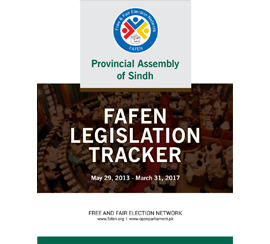- Passes 142 legislative proposals including 10 Private Members’ Bills
- Ruling party fulfills less than one third promises committed in 2013 Election Manifesto
- Sindh Transparency and Right to Information Bill, 2016 and Hindus Marriage Bill among important provincial legislations
- No legislation done in justice system, policing and civil services, inclusion of youth in policy-making, women empowerment, regulation of agricultural inputs and trade unions
ISLAMABAD, April 21, 2017: The incumbent Provincial Assembly of Sindh passed 142 pieces of legislation from May 29, 2013 to March 31, 2017- averaging almost three bills a month. The Assembly passed 108 bills (three quarters) without referring them to the relevant standing committees while 63 (37%) bills were passed on the day of introduction. The ruling party in the province of Sindh has been able to fulfill less than one third of the specific provincial-level legislative promises it made in its election manifesto of 2013.
Analyzing the assembly’s bills, it was observed that out of 142 bills presented, 30 were to legislate on subjects devolved under 18th amendment, 63 pertained to the executive needs of the province and 49 were legislative proposals focusing on public welfare issues, which were mostly in line with the party manifesto commitments.
The assembly approved charters for establishing 13 higher education medical and technical institutions, which is an attempt or response to counter the Sindh’s education crisis. Following the precedent set by Punjab and Khyber Pakhtunkhwa (KP) assemblies, the Sindh Assembly also enacted the right to information (RTI) legislation, granting citizens the right to access information in all matters of public importance. The RTI bill was warranted by the provincial obligations after the enactment of the 18th Constitutional Amendment. Through other legislation, the assembly covered the themes like institutional development and reforms (42), local government and good governance (24), health sector (18), labour rights and employment regulations (15), human rights and social welfare (13) and others (30).
PPPP has a majority (56%) of the Sindh Assembly’s seats that makes it easy for them to push through the prescribed legislative process. However, the Rules of Procedure and Conduct of Business of the assembly as well as best parliamentary practices require conformity with certain norms that ensure democratic and consultative spirit in lawmaking. The rules of procedure require each bill to go through committee review before its consideration in the plenary. Moreover, as per rules, no motion for the consideration of a bill can be moved without giving members three days after provision of copies of the bill to them. The Sindh Assembly, in most cases, did not follow these procedural requirements neither the exemptions from these were sought through formal motions. Less than a quarter of bills introduced were referred to committees for detailed review while all the remaining bills were passed without any committees’ consent. During the reporting period, only 34 bills (24%) were referred to the committees. As many as 63 (37%) bills were considered and passed on the same day when they were introduced. Such hasty legislation deprived the members an opportunity to review the legislation.
On an average, every bill passed took an average 39 days to undergo the entire legislative process. Analyzing the bills’ thematic focus, each bill on security took an average of 11 days for passage. Similarly, the bills pertaining to economy were passed in 18 days, local government and good governance 21 days, institutional development and reforms 25 days, labour rights and employment regulations 31 days, health 38 days, education 48 days, environment and agriculture 62 days, accountability and transparency 110 days, and human rights and social welfare 150 days.
Exploring the bills’ categorization, out of 142, 132 were introduced by the government, while the remaining 10 were sponsored by Private Members. Private Members submitted a total of 30 bills, of which 20 are still pending. On average, each government bill took 33 days for passage, while each Private Member’s bill took 127 days. As many as 14 bills passed by the Assembly were initiated as ordinances while the remaining originated in the Assembly.
To download complete report, click here | To download Urdu Press Release, click here


